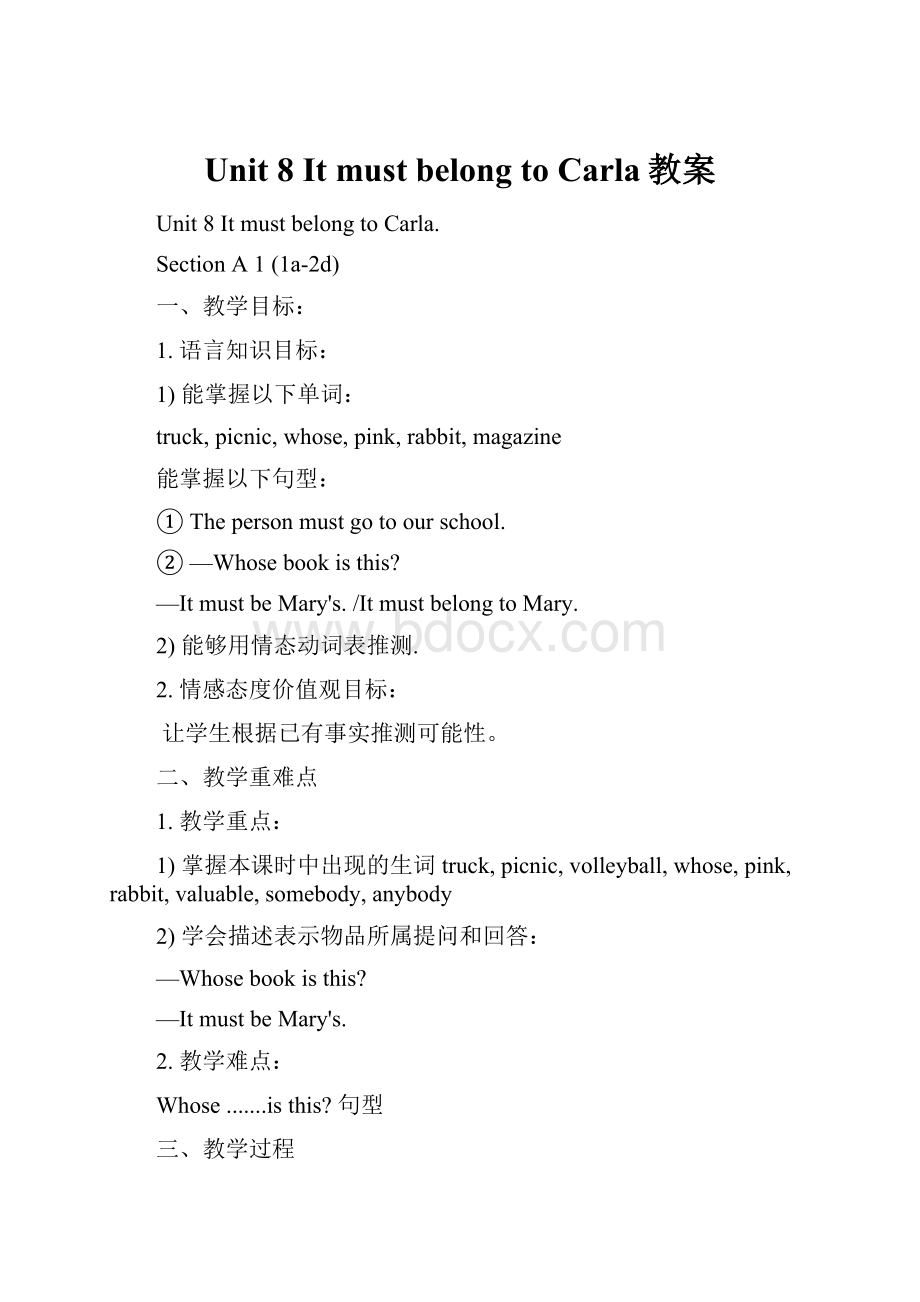Unit 8 It must belong to Carla教案.docx
《Unit 8 It must belong to Carla教案.docx》由会员分享,可在线阅读,更多相关《Unit 8 It must belong to Carla教案.docx(18页珍藏版)》请在冰豆网上搜索。

Unit8ItmustbelongtoCarla教案
Unit8ItmustbelongtoCarla.
SectionA1(1a-2d)
一、教学目标:
1.语言知识目标:
1)能掌握以下单词:
truck,picnic,whose,pink,rabbit,magazine
能掌握以下句型:
①Thepersonmustgotoourschool.
②—Whosebookisthis?
—ItmustbeMary's./ItmustbelongtoMary.
2)能够用情态动词表推测.
2.情感态度价值观目标:
让学生根据已有事实推测可能性。
二、教学重难点
1.教学重点:
1)掌握本课时中出现的生词truck,picnic,volleyball,whose,pink,rabbit,valuable,somebody,anybody
2)学会描述表示物品所属提问和回答:
—Whosebookisthis?
—ItmustbeMary's.
2.教学难点:
Whose.......isthis?
句型
三、教学过程
(一)Languagepoints
1.ItmustbelongtoCarla.
belongto意为“属于”,它一般不用于
进行时态和被动语态。
如:
ThehairbandbelongstoAnna.(√)
ThehairbandisbelongingtoAnna.(×)
ThehairbandisbelongedtoAnna.(×)
此外,belongtosb.通常可以和名词性物主代词或名词所有格(一般是’s所有格)互相转换。
如:
Thebluejacketbelongstohim/Jerry.→
Thebluejacketishis/Jerry’s.
2.Well,wheredidyoulastputit?
lastadv.上次;最近的一次;最后一次
last除用于句末外,还常置于句子中间。
e.g.WhenIlastsawher,shewasworkinginShanghai.
我上次见她时,她在上海工作。
Whendidyouseehimlast?
你最近见到他是什么时候?
3.Iattendedaconcertyesterdaysoitmightstillbeinthemusichall.
辨析join/takepartin/attend
join指加入某个党派,团体组织等,成为其中一员,意为“参军,入党,入团”。
e.g.jointheArmy/theParty/theLeague
joinsb.in(doing)sth.和某人一道做某事
e.g.Willyoujoinusinthepicnic?
你参加我们的野炊吗?
joinin多指参加小规模的活动如“游戏,比赛”,口语中常用。
e.g.Joininthebasketballgame.参加篮球赛。
takepartin指参加会议或群众性活动,着重说明主语参加该项活动并在活动中发挥作用。
e.g.We’lltakepartinthesportsmeeting/club.
takeanactivepartin积极参加……
attend正式用语
vt.指参加会议,婚礼,葬礼,典礼;去上课,上学,听报告等。
句子主语只是去听,去看,自己不一定起积极作用。
e.g.Iattendedanightschool.我上夜校。
4.Ithinksomebodymusthavepickeditup.
must在此处表示推测,意为“一定”。
英语中当情态动词后接havedone时,表达对过去的事情进行推测,故musthavedonesomething表示“过去一定做过了”这样的意思。
e.g.He’splayingoutside.Hemusthavefinishedhishomework.
5.I’llcallthemnowtocheckifanybodyhasit.
anybodypron.任何人
常用于否定句或疑问句中;当用于肯定句中时,相当于anyperson,意为“任何
人”。
e.g.Iwillnottellanybodythesecret.
Isthereanybodyintheoffice?
Anybodycoulddoit!
(二)Homework
1.Recitetheconversationsin2d.
2.Finishtheexercisesintheworkbook.
教学反思:
SectionA2(3a-3c)
一、教学目标:
1.语言知识目标:
1)学习掌握下列词汇:
policeman,noise,wolf,happening,uneasy
2)阅读短文,能按要求获取相关的信息。
3)通过阅读训练来提高学生们的阅读能力。
4)学习运用情态动词表推测。
2.情感态度价值观目标:
面对身边暂时不可解释的现象,根据已有证据进行合理推测。
不信谣,不传谣。
二、教学重难点
1.教学重点:
1)掌握本部分出现的生词和词组,达到熟练运用的目标。
2)阅读短文,获得相关的信息。
通过阅读练习,来提高阅读能力。
2.教学难点:
1)阅读短文,获得相关的信息的能力。
2)理解并运用所学的词汇及表达方式。
三、教学过程
(一)Revision
1.Haveadictationofthenewwordslearnedinthelastclass.
2.Checkthephrases.
(二)Reading
Languagepoints
1.Itusedtobeveryquiet.
usedtodosth曾经,过去常常(现在不做了)
beusedtodosth.(=beusedfordoingsth.)被用来做……
beusedtodoingsth习惯于做……
2.However,thesedays,somethingunusualishappeninginourtown.
构成:
不定代词+形容词(定语后置)
e.g.一些重要的事情somethingimportant
un-表示否定usual通常的unusual不平常的
happy快乐的unhappy不快乐的
3.Victor,ateacheratmyschool,isreallynervous.
ateacheratmyschool在句中作同位语。
它指的是Victor。
e.g.Mysister,Helen,willhaveapicnicwithme.
我的姐姐海伦将和我一起野餐。
4….butIcouldn'tseeadogoranythingelse,either.
too“也”肯定句。
句末。
also“也”肯定句。
句中,be后面,行为动词前。
either“也”否定句。
句末。
e.g.Sheisasinger,too.她也是个歌手。
HecanalsosingtheEnglishsong.他也可以唱英文歌。
Ifyoudon'tgotothepark,hewon'tgothere,either.如果你不去公园,他也不去。
5.Onewomanintheareasawsomethingrunningaway.
seesb.doingsth.看见某人正在做某事
(强调动作正在发生)
seesb.dosth.看见某人做某事
(强调发生的整个过程)
e.g.Iseemomcookinginthekitchen.
我看见妈妈正在厨房做饭。
Lucysaidshesawmedothehousework.
露西说她看见我做家务了。
6.Thenoise-makerishavingtoomuchfuncreatingfearintheneighborhood.
havefundoingsth.做某事玩得愉快。
=haveagoodtimedoingsth.
=enjoydoingsth.
e.g.Ihavefunflyingkites.我享受放风筝的乐趣。
(三)Homework
1.Makesentenceswiththesewords.
usedto,havenoidea,too...to...,
seesbdosth,seesbdoingsth
2.Reviewthearticle.
教学反思:
SectionA3(GrammarFocus-4c)
一、教学目标:
1.语言知识目标:
1)学习掌握下列词汇:
laboratory,coat,sleepy,pocket
2)进行一步复习巩固学习SectionA部分所学的生词和词组。
3)掌握情态动词的用法和物体所属的句型。
2.情感态度价值观目标:
面对身边暂时不可解释的现象,根据已有证据进行合理推测。
不信谣,不传谣。
二、教学重难点
1.教学重点:
1)复习巩固SectionA部分所学的生词和词组,达到熟练运用的目标。
2)总结情态动词的用法。
2.教学难点:
1)学习运用情态动词的用法。
2)掌握物体所属的句型。
三、教学过程
(一)Revision
Reviewsomemainphrasesandsentenceswelearnedinthelastclass.
(二)TrytoFind
情态动词表推测,可能性:
must>can/could>may/might
一、must
表示可能性最大的肯定推测,意思是“一定、准是”。
只能用于肯定句。
如果要表示“一定不”,应该用can't。
如果询问可能性时,应该用can。
e.g.Hemustknowtheanswers.他肯定知道答案。
Hecan'tknowtheanswers.他肯定不知道答案
Canheknowtheanswer?
他知道答案吗?
二、can/could
can表示推测“可能性”时,一般用于否定句或疑问句。
can在疑问句中意思是“会,可能”。
e.g.Hecan’tpickherschoolbagup.他不可能拿了她的书包。
could用于表示某事有可能发生或可能是事实。
e.g.Don’teatit.Itcouldgobad.不要吃它,可能坏了。
Theplanecouldbeputoffbythestorm.这趟飞机可能会因为暴风雨而推迟。
could可用于表示客气、礼貌、委婉的请求语气。
Couldyoupleasehelpmewithmyhomework?
你能帮我完成我的家庭作业吗?
3、may/might
may,might表示推测“可能性”时,意思是“可能”,“也许”。
might不表示过去时态,语气更委婉,可能性更小。
may,might表推测时,可用于否定句,但不用于疑问句。
e.g.Hemay/mightnotbeathome,butI'mnotsure.他可能不在家,不过我也不确定。
四、推测时态
1.must:
推测现在/正在/过去发生的动作。
e.g.Hemusthaveacarnow.
(现在)他一定有一辆小汽车。
Hemustbefinishinghishomeworkathome.
(正在进行)他一定在家做作业。
Hemusthavefinishedthework.
(过去)他一定已完成了工作。
2.can
can/can’t后可接进行时/完成时,表示对现在发生的动作或过去发生的动作进行推测。
e.g.Theycan’tbereadinginthelibrary.他们一定不在图书馆读书。
Hecan’thavegonetoShanghaibecauseIsawhimjustnow.
他不可能去了上海,我刚看见他了。
3.may/might
may,might可以推测现在正在发生的动作或过去发生的动作,还可以推测将来的情况。
e.g.Hemay/mightbesleepingnow.
(现在)他可能正在睡觉。
Thesepeoplemay/mighthaveseenthefilmbefore.
(过去)这些人以前可能看过这部电影。
Itmayrain.Therearesomeclouds.
(将来)可能会下雨。
因为有一些乌云。
(三)Exercises
Choosethecorrectanswer.
1.—Excuseme.IsthistherightwaytotheSummerPalace?
—Sorry,Iamnotsure.It________be.
A.mightB.willC.mustD.can
2.—Isn’tthatAnn’shusbandoverthere?
—No,it____behim—I’msurehedoesn’twearglasses.
A.can’tB.mustnotC.won’tD.maynot
3.You______betired—you’veonlybeenworkingforanhour.
A.mustnotB.won’tC.can’tD.maynot
4.—IsJohncomingbytrain?
—Heshould,buthe________not.Helikesdrivinghiscar.
A.mustB.canC.needD.may
(四)Practice
Workon4a.Choosethebestwaytocompleteeachsentenceusingthewordsinbrackets.
1.让学生们理解句子意思。
1.A:
Where’sJean?
B:
I’mnotsure.She______(is/mightbe/mustbe)inthelaboratory.
2.A:
Everyoneisgoingtothepoolafterschool.
B:
Really?
It_______(mustbe/can’tbe/couldbe)hotoutdoors.
3.A:
That’sthephone.
B:
Hmm.Iwonderwhoit_______(mustbe/couldbe/shouldbe).
4.A:
IwonderifthereareJim’sglasses.
B:
They_______(can’tbe/mightbe/couldbe)his.Hedoesn’twearglasses.
5.A:
Ihearwaterrunninginthebathroom.
B:
It_______(couldbe/mustbe/can’tbe)Carla.Shewasthinkingoftakingashower.
2.根据句意选择正确的情态动词。
3.最后,通读一遍句子,进行综合理解,看句子内容是否通顺,合理。
4.ChecktheanswerswiththeSs.
Keys:
mightbe,mustbe,couldbe,can’tbe,mustbe
5.Explanation.
(1)besure(of/aboutsth/doing)确信...,对...有把握
besuretodosth“必定”,“必然会”,"准会"
(2)表示“位移”的动词用现在进行时态表将来,例如:
go去,come来,leave离开,arrive到达,return回来,fly飞。
(3)wonderv.“想知道”(wanttoknow)
Nowonder+句子“难怪.....”
e.g.Nowonderyouareangry.难怪你觉得生气。
(4)thinkof想要;打算
e.g.Ithoughtofplayingbasketball.我想打篮球。
Workon4b.Completetheseresponses.
1.TellSstounderstandthesentences.
1.A:
Manypeoplearewearingcoats.
B:
Theweathermustbe____.
2.A:
Sallyhasbeencoughingalot.
B:
Shemightbe_______.
3.A:
Thisrestaurantisalwaysverycrowded.
B:
Thefood________________.
4.A:
WheneverItrytoreadthisbook,
Ifeelsleepy.
B:
Itcan’t_____________________.
2.LetSswritedownpossibleanswersasmuchaspossible.
3.LetSschecktheiranswerswiththeirpartners.
4.Checktheanswerstogether.
Keys:
cold,sick/ill,mustbedelicious,beinteresting/attractive
(五)Homework
RemembertheGrammar.
Finishtheexercisein4c.
教学反思:
SectionB1(1a-2e)
一、教学目标:
1.语言知识目标:
1)能掌握以下单词:
UFO,alien,runafter,suit,express,notonly...butalso...,circle,Britain,receive,leader,midsummer,medical,prevent,energy,position,burial,honor,ancestor,victory,enemy,period
2)能掌握以下重难句子:
①Formanyyears,historiansbelievedStonehengewasatemplewhereancient
leaderstriedtocommunicatewiththegods.
②Thelargestoneswereputtogetherinacertainway.
Asyouwalkthere,youcanfeeltheenergyfromyourfeetmoveupyourbody.
2.情感态度价值观目标:
通过学习英国巨石阵,培养对事物的探索精神。
不信谣,不传谣。
二、教学重难点
1.教学重点:
1)掌握本课时出现的生词及用法。
2)进行听力训练,提高综合听说能力。
3)阅读短文,获得相关信息,提高学生们的综合阅读能力。
2.教学难点
1)听力训练
2)阅读2b部分的短文并完成相关要求。
三、教学过程
(一)Leadin
1)ShowsomepicturesoftheUFOandaliens.
2)Workon1a
1.Sslookatthepicturesin1a.Trytounderstandwhat’shappening.
2.LetSswriteasentenceabouteachpicture.
Possibleanswers:
Thealienisrunningaftertheman.
Themanisrunning.
(二)Listening
Workon1c:
1.TellSstoreadthesentencesin1candtrytounderstandthemeaningofthem.
2.PlaytherecordingfortheSs.Ssjustlistenforthefirsttime.PlaytherecordingagainandcheckthesentencesSshear.
3.Checktheanswers.
(三)Reading
Languagepoints
1.expressv.表达,表示
expressionn.表达,表示,表情
e.g.Itexpressesmyloveforthenovel.这表达了我对这部小说的爱。
anexpressionofsupport表示支持
2.receivev.接受;收到
e.g.YesterdayIreceivedhisgift,butIdidn’tacceptitsoIreturnedittohim.
昨天我收到了他的礼物,但是我没有接受并且退回去了。
3.leadern.领导,领袖leadv.带领
e.g.Workersleadtheleaders